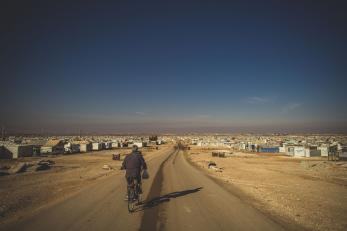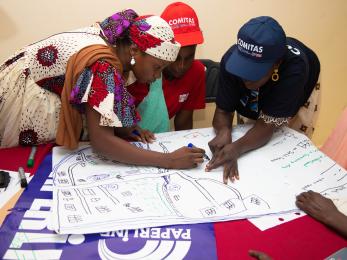From Jordan to Jihad: The Lure of Syria’s Violent Extremist Groups

Earlier this year, the conflict embroiling Syria hit another benchmark: the war’s number of foreign fighters now tops Afghanistan in the 1980s. Syria has become the training ground of choice for today’s violent jihadis.
Though Jordan is one of the few countries in the Middle East region blessed with relative stability, Jordanians are actively contributing to the growth of fighters in neighboring Syria and Iraq. The implications of the foreign fighter phenomenon are manifold and dangerous. Jordan’s jihadis will likely be a generational plague to peace and stability, whether they stay in Syria or return home. The goal is to convince them not to go in the first place.
Mercy Corps conducted research to better understand what drives Jordanians to fight in order to influence evolving policy and programming seeking to mitigate violence, promote stability and advance safety for all civilians caught in the cross-fires of the region’s tragic spiral of violence. Our new report provides some key recommendations:
- Broker a political solution to end the crisis inside Syria in order to stop the flow of foreign fighters. The number of foreign fighters inside Syria now tops Afghanistan in the 1980s, making Syria the training ground of choice for today’s violent jihadis. Efforts to counter violent extremism and stem the flow of foreign fighters will prove futile if detached from a comprehensive political approach to end the crisis in Syria.
- Focus future prevention programs on social networks, not demographics. Recruitment is rooted in the cultivation of a tightly-knit, collectivist identity. Prevention efforts should focus on providing community-based alternatives: incorporating youth into peaceful groups, mentorship, and creating opportunities for youth to build individual identities and positive family connections.
- Support, educate and partner with peaceful local actors – particularly wives and mothers – to dissuade potential recruits. Trusted community voices are the ones most likely to foster peaceful views and offer positive role models. Educating them about the reality of the war in Syria – of Sunnis killing Sunnis – may resonate even among those who are broadly supportive of the conflict. Local tribal leaders and imams, for instance, are valuable shapers of opinion. And mothers’ groups, in particular, have much to offer in blunting the appeal of extremists.
- Where possible, facilitate spaces where former fighters can serve as prevention advocates and mentors within communities and universities.
- Increase political and financial support for programs that address governance gaps that drive extremism.


